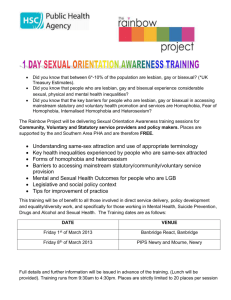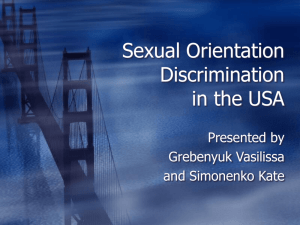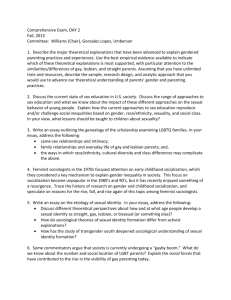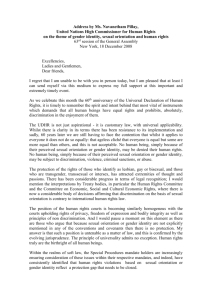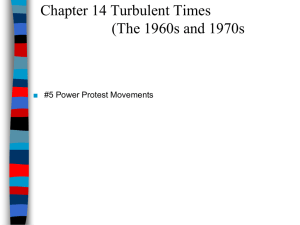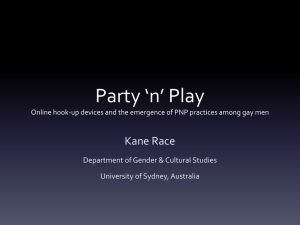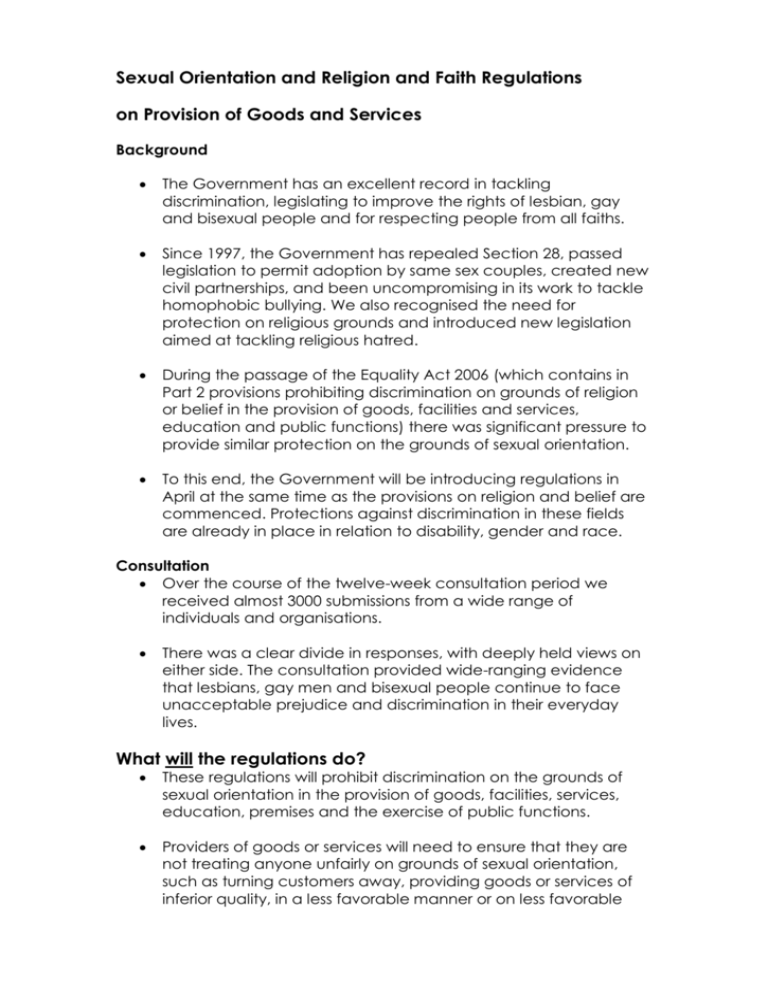
Sexual Orientation and Religion and Faith Regulations
on Provision of Goods and Services
Background
The Government has an excellent record in tackling
discrimination, legislating to improve the rights of lesbian, gay
and bisexual people and for respecting people from all faiths.
Since 1997, the Government has repealed Section 28, passed
legislation to permit adoption by same sex couples, created new
civil partnerships, and been uncompromising in its work to tackle
homophobic bullying. We also recognised the need for
protection on religious grounds and introduced new legislation
aimed at tackling religious hatred.
During the passage of the Equality Act 2006 (which contains in
Part 2 provisions prohibiting discrimination on grounds of religion
or belief in the provision of goods, facilities and services,
education and public functions) there was significant pressure to
provide similar protection on the grounds of sexual orientation.
To this end, the Government will be introducing regulations in
April at the same time as the provisions on religion and belief are
commenced. Protections against discrimination in these fields
are already in place in relation to disability, gender and race.
Consultation
Over the course of the twelve-week consultation period we
received almost 3000 submissions from a wide range of
individuals and organisations.
There was a clear divide in responses, with deeply held views on
either side. The consultation provided wide-ranging evidence
that lesbians, gay men and bisexual people continue to face
unacceptable prejudice and discrimination in their everyday
lives.
What will the regulations do?
These regulations will prohibit discrimination on the grounds of
sexual orientation in the provision of goods, facilities, services,
education, premises and the exercise of public functions.
Providers of goods or services will need to ensure that they are
not treating anyone unfairly on grounds of sexual orientation,
such as turning customers away, providing goods or services of
inferior quality, in a less favorable manner or on less favorable
terms than would normally be the case (e.g. hostile or less
courteous).
Religious organisations
The activities of religious organisations which are closely
associated with doctrine – such as worship and teaching – will be
capable of benefiting from an exemption from the sexual
orientation regulations.
Following a very strong response to consultation on this issue we
are proposing to broadly follow the Northern Ireland approach
which is in turn based on that in Part 2 of the Equality Act. This
means that it can include wider voluntary activities taking place
under the auspices of a religion if certain tests are satisfied.
The exemption will not be available to organisations whose sole
or main purpose is commercial. The exemption will not be
available where religious organisations deliver a service to the
public, for a public authority.
Religious adoption agencies
The regulations will apply to religious adoption agencies but they
will be given until the end of 2008 to adjust. This is in order to:
prevent any disruption to services currently being provided to
adoptive parents and children; ensure that much valued and
needed services do not close overnight and that we do not see
an overall reduction in services in the long run.
In the interim, there will be a new statutory duty on agencies to
refer gay, lesbian and bi-sexual couples to agencies who are
able to assist. The Prime Minister has commissioned an on going
independent assessment of the issues agencies will need to
address in the transition period and the impact the regulations
have on adoption services.
Schools
There will be no exemptions for teaching in schools, including
faith schools. The regulations will not impact on anybody’s
freedom to express their views in an appropriate manner - and
that includes doctrinal belief. What they will do is address
discrimination of young people because of their sexuality or that
of their parents.
What these regulations will seek to do is ensure schools can’t turn
away gay pupils or pupils with gay parents at the admission
stage, and that if a gay pupil was being bullied by either
teachers or pupils and the school wasn’t dealing with it, they
could be challenged.
Public sector
The regulations will allow for separate services in both the
voluntary and public sector to continue to address the specific
needs of lesbian, gay and bisexual people.
Charities
Some charities may need to be able to continue to work
exclusively with and for lesbian, gay and bisexual people in line
with the terms of their charitable instruments. These will be
exempt.
We will also follow the consultation proposal that clubs or
associations which exist in order to provide a genuine benefit or
opportunity to a group linked to their sexual orientation should
be permitted to include the sexual orientation of a person in their
membership criteria. There are comparable provisions in
discrimination legislation for other strands.
What the regulations won’t do
The consultation has made it clear that the regulations on sexual
orientation will not apply to religious observance or religious
practices arising from the basic doctrines of a faith.
Unlike in Northern Ireland, these regulations will not include
specific protection from harassment on the grounds of sexual
orientation outside the workplace. The question of whether to
introduce such measures will be one of the many issues which
the Government will be consulting on as part of the
Discrimination Law Review later this year.
Schools
The situation as regards sex education will not change. Schools
are obliged to develop their sex education in consultation with
parents to make sure lessons have the widest support possible.
Parents will still be able to withdraw their children from sex
education should they choose to do so.
Schools will still be able to teach about traditional family values.
This will include describing religious teaching with regard to
marriage, homosexuality or homosexual sexual practice, in the
course of acts of worship on school premises, religious education
classes or in other contexts where such an explanation is
appropriate and relevant.
The regulations will not prevent individual teachers from
expressing comments or viewpoints in the area of sexual
orientation based on their particular religion.
Civil Partnerships
The introduction of Civil Partnerships provides legal recognition
for same-sex couples who choose to register their relationships.
Their introduction directly addressed many of the injustices samesex couples faced in their daily lives because of a lack of legal
recognition such as being treated as next of kin when a partner
dies or is sick.
Civil partnership is an entirely civil process. The regulations will not
interfere with Ministers of Religion officiating in religious marriage
or blessings or force them to bless same-sex partnerships.
Law on marriage and civil partnership explicitly rules out Ministers
of Religion conducting same-sex marriages in church. Like civil
marriage, civil partnerships cannot take place on religious
premises and religious marriage cannot take place between
same-sex couples.
Why the difference between Great Britain and Northern
Ireland?
Northern Ireland has a separate equality law framework from the
rest of the UK. The Equality Act 2006 included separate ordermaking powers to outlaw discrimination on grounds of sexual
orientation for Northern Ireland and Great Britain.
The Northern Ireland regulations were developed by the Office
of First Minister and Deputy First Minister (OFMDFM) and
commenced 1January 2007. These included protection from
harassment on the grounds of sexual orientation outside the
workplace. A judicial review of the Northern Ireland regulations is
presently underway.
The sexual orientation regulations for Great Britain were originally
due to come into force in the Autumn, alongside Part 2 of the
Equality Act. Due to the need for officials to give proper
consideration to the extremely high level of responses received,
the commencement date for these regulations, and Part 2 of the
Equality Act will now be April 2007.

